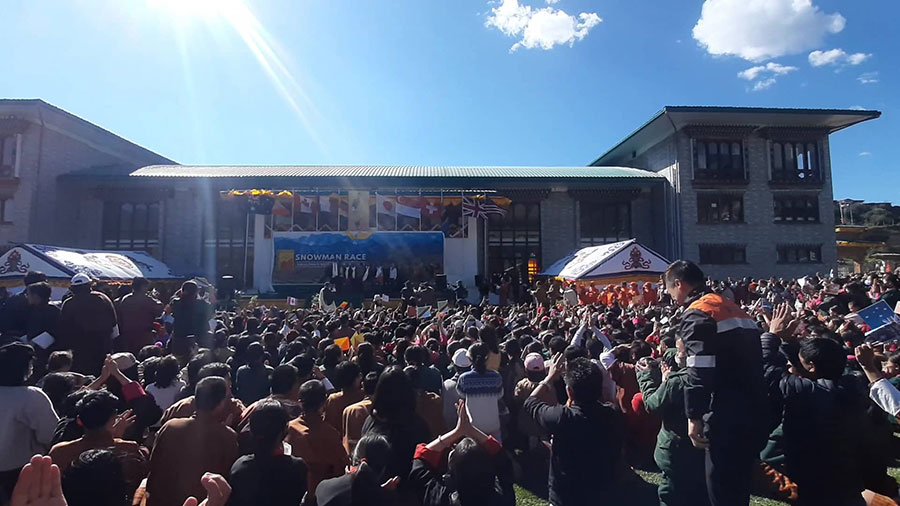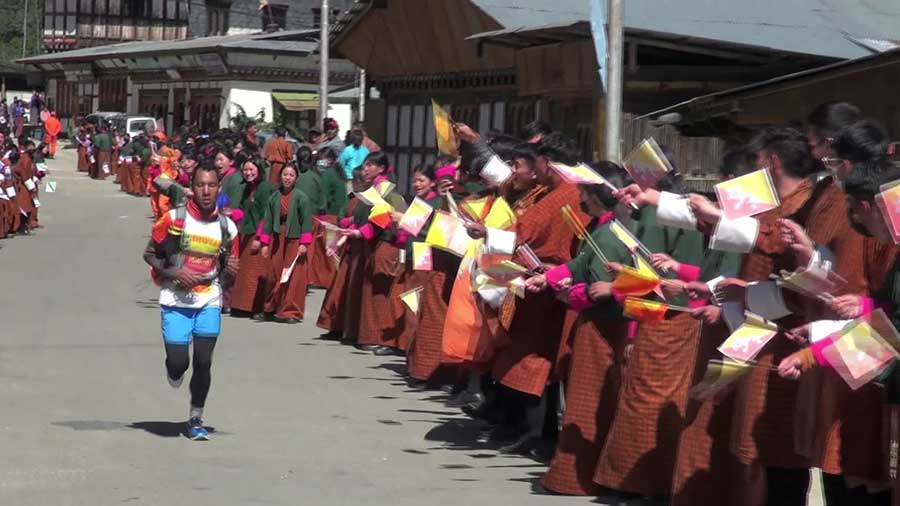
The first-ever Snowman Race came to a close today with 17 runners completing the 5-day ultra-marathon at Chamkhar in Bumthang. The race dubbed one of the toughest in the world saw 29 international and Bhutanese athletes taking part in it. However, 12 of them decided not to continue the race.
 As the runners touched the finish line, hundreds of people gathered at Chamkhar football ground cheered them. Eleven men and six women athletes completed the race. Sangay, Gawa Zangpo and Sangay Wangchuk are the top three racers for the day. They finished the final 43-kilometre lap in less than 5 hours, which would usually take 2 days on foot.
As the runners touched the finish line, hundreds of people gathered at Chamkhar football ground cheered them. Eleven men and six women athletes completed the race. Sangay, Gawa Zangpo and Sangay Wangchuk are the top three racers for the day. They finished the final 43-kilometre lap in less than 5 hours, which would usually take 2 days on foot.
“It was really difficult but was adventurous at the same time. I have reached places where I have never been. Most of all, I am happy that I made it safely from Gasa to Bumthang,” said Gawa Zangpo.
“I would say it’s quite difficult to put the experience in words. The mountains, the people; a term that we use often when we were there was magical. I have done a lot of races which were claimed the toughest in the world and I would say in many ways the Snowman Race is the toughest,” said Luke Nelson, from the United States.
“This is my first experience in Bhutan, my first time being with Bhutanese people. It was really moving to chase them around every day. And also we are not here just to be racers, we are here to be a learner and then to be storytellers, so that’s what kept me going when it was difficult,” added Meghan Hicks, also from the United States.
“I was praying the whole time that I don’t come across wild animals. However, I had a great experience as the race went on seeing beautiful landscapes. I have never imagined there would be such a beautiful place like those that I came across even if I am Bhutanese,” said Kinzang Lhamo.
Snowman Race aims at bringing global attention to climate action. The runners shared their experiences of signs of climate change seen along the racecourse.
“You could see the mountain and the glacier and the large marine where the glacier had been and I could only imagine that a couple of decades ago that would have been full of ice and now there are ponds of water and just rocks,” said Sarah Keyes, from the United States.
According to her, the muddy trail was beyond anything she experienced. “I think the amount of rain you have been receiving is directly related to climate change as well. There’s that extreme of very dry at times and very wet and that certainly doesn’t do any good to the trail to be that wet,” she added.
Claire Perks, from Canada, observes the devastating effect of climate change on the Gasa Tsachhu. The racers were at the hot spring before they started the race. The Tsachhu was washed away by a flood last year.
“On day 3, we went through a very wide riverbed and you can see how the river has meandered all over the place and carved away different parts. A really nice old farmer came out with a bowl of apples for us and gave us some apples and we talked to him for a couple of minutes and he was telling us how the river used to be really big and wide and that it was just trickling,” she added.
The official declaration of the winners and prize-awarding ceremony will be held tomorrow morning. A tree-nurturing programme will also be conducted followed by the Bhutan Climate Action Conclave in the evening.
Kipchu, Bumthang








